|
0 Comments
Join us on Wednesday, April 17 at 7pm ET on Facebook Live for a multigenerational dialogue featuring our training team and extended family of multifaceted Black femmes and women from various walks of life as they join together to TALK!
Our diverse panel includes reverends, professors, students, and entrepreneurs, all sharing their experiences navigating the world as Black femmes and women. This conversation offers unique insights about a unique experience! After the event, the recording will be posted here. We are excited to jump into our next iteration of our Racism is Real Dialogue series in 2024 with Co-Director & Trainer, Bethany Stewart (she/her) and Trainer, Thulani Conrad Moore (he/him)
To wrap up Black History Month, Bethany and Thulani engaged in an intergenerational conversation on "What is Blackness?" They offered a Sankofa moment on the importance of knowing the past to shape the future. This dialogue took place on February 29, 2024 on Facebook Live. Click "read more" to view the recording. With great joy we celebrate growth in the leadership of Roots of Justice! Since 2021, Courtney Anika has served as Executive Director and has brought excellent administrative leadership and vision to the Collective. She is excited to now serve as Director of Operations and Development on a Co-Director team.
Bethany Stewart, who has been a trainer with Roots of Justice since 2019, is coming on staff as Director of Curriculum and Marketing. Having two Black femme Co-Directors of Roots of Justice for the first time positions us well for increased growth and depth as we move into the future. We have some projects in the works, such as an update of our Set Free curriculum, and a forthcoming launch of a coaching group for BIPOC professionals serving in predominantly White institutions. Please help us welcome Bethany on staff and celebrate our Co-Directors! You can support Black femme leadership by giving to our Sustainable Leadership campaign, which we opened on Giving Tuesday, November 28, 2023. We need your help to raise $10,000 by the end of 2023 to support our new Co-Director model that lifts up Black femme joy and creativity and promotes rest and sustainability. Will you make a gift today? Our November Racism is Real dialogue is an opportunity to get to know our new Co-Directors, Bethany Stewart and Courtney Anika. A conversation between two Black femmes imagining a world that centers equity and belonging.
Click "read more" to access the recording. Celebrate our New Co-Directors and help us meet our $10,000 fundraising goal to deepen our roots: https://www.flipcause.com/secure/cause_pdetails/MTk2MzY3 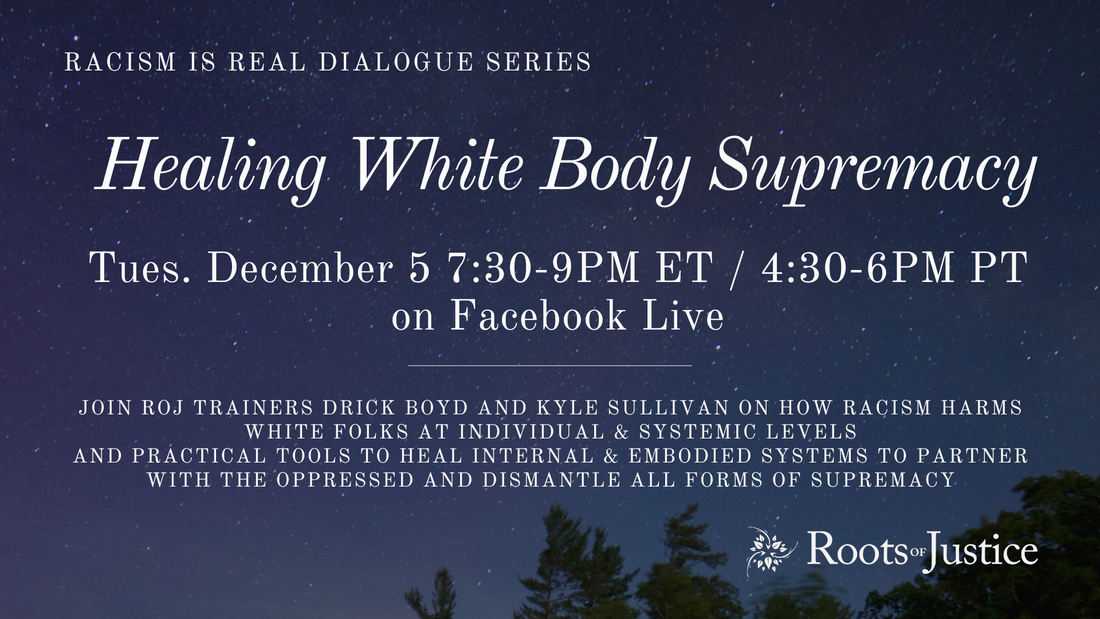 Our December Racism is Real conversation was facilitated by ROJ Trainers Kyle Sullivan and Drick Boyd
Join us for: - embodied practices that help increase capacity to deal with the discomfort of embodied white supremacy - a more comprehensive understanding of how racism impacts and harms white folks ability to be fully human from the individual to the systemic. - practical tools to be with and heal the ways racism impacts their internal and embodied system for the purpose of partnering with the oppressed to dismantle all forms of supremacy in the collective. Click on Read More to access the recording. Our September conversation built upon our April dialogue, which provided a brief history of the Doctrine of Discovery; described the impact on Indigenous and African people- past and present, and explored ways we can come together for our collective healing.
This September Racism is Real conversation offered two sacred spaces/breakout groups for BIPOC and White people to reflect on the topic and their experiences. The BIPOC caucus featured ROJ trainer Thulani Conrad Moore with Dr. Kyle Mays and Dr. Edward Valandra. The White caucus featured ROJ trainers Rev. Lorie Hershey, Dr. Drick Boyd, and Rick Derksen. This event took place on Sunday, September 17 4-5:30pm PT / 7-8:30pm ET on Zoom (not on Facebook Live). Participants joined their group's caucus after (re)watching the April conversation. This event was not recorded in order to protect the sacred space. Our participants: Edward C Valandra, Ph.D., is Sicangu Titunwan, born and raised on the Rosebud Sioux Reservation. His research focuses on the national revitalization of the Oceti Sakowin Oyate (People of the Seven Fires, commonly called the D/L/Nakota people) and the development of Native Studies. Dr. Valandra is the founder and Research Fellow for the Community for the Advancement of Native Studies (CANS), a Native-government-chartered, research-based, reservation-rooted organization. Kyle T. Mays (he/his) is an Assistant Professor of African American Studies, American Indian Studies, and History at UCLA. He is the author of Hip Hop Beats, Indigenous Rhymes: Modernity and Hip Hop in Indigenous North America (SUNY Press, 2018). His most recent book is An Afro-Indigenous History of the United States (Beacon Press) which argues that African enslavement and Indigenous dispossession have been central to the founding of the United States, and explores how Black and Indigenous peoples have resisted U.S. democracy from the founding of the U.S. to the present. ROJ Trainer bios are available here. Check out these books by our panelists! Colorizing Restorative Justice: Voicing Our Realities (2020, Living Justice Press) - edited by Dr. Valandra, with essays featured by Rev. Michelle, Erica, and other women of color: https://livingjusticepress.org/product/colorizing-restorative-justice-2/ An Afro-Indigenous History of the United States (2021, Beacon Press) by Dr. Kyle Mays (affiliate link) https://bookshop.org/p/books/an-afro-indigenous-history-of-the-united-states-kyle-t-mays/16258852?aid=83165&ean=9780807011683&listref=roots-of-justice-collective-recommends Facebook Live conversation with members of the ROJ Collective and friends
Thursday, Aug. 24 at 4pm PT (7pm ET) This Racism is Real conversation was led by ROJ Trainers Maati Yvonne Platts and Thulani Conrad Moore and featured youth activists Nurah Abdulhaqq and Erin Gill-Wilson. This is a free event, and we ask you to support our work with a $10-20 donation to continue to make important conversations like this one possible. Please give here. Join us on Facebook live: facebook.com/RootsOfJusticeInc Thank you to Mosaic Mennonite Conference who sponsored this dialogue! Click on "read more" below to watch the recording. By Thulani Conrad Moore, ROJ Trainer
The Supreme Court upholds the myth of white supremacy in our constitutional oligarchy we naively call a democracy. If our analysis of the Supreme Court decision solely focuses on its negative impact on people of color, we overlook the broader implications. The harm inflicted upon people of color is merely the surface-level manifestation or the tip of the iceberg, so-to-speak, of a much deeper issue. This decision serves to reinforce the persistent myth of white superiority and further sustains the very purpose of racism itself—to uphold privilege and power for white individuals, while demanding that the rest of society play along with the illusion of equal access. By solely addressing the immediate consequences for people of color, we fail to address the systemic roots of racism. The Supreme Court's recent decision to maintain white male dominance reveals a pattern that has persisted throughout the history of the United States. Contradiction, confusion, hypocrisy, and deception have been instrumental in upholding this dominance. By Rev. Dr. Calenthia S. Dowdy, ROJ Trainer
I hadn’t intended to write this. It’s Sunday morning, July 2nd, and I’m sitting in my easy chair watching CBS News Face the Nation. Former Vice President, Mike Pence, one of the many hopefuls in the Republican party to be their nominee for President is being interviewed. Naturally he was questioned about the recent Supreme Court decision to end Affirmative Action in colleges and universities. When asked if fundamentally he believed there was racial inequity in the education system in the U.S., Pence responded by saying... “I really don’t believe there is, I believe there was, there may have been a time when Affirmative Action was necessary simply to open the doors to all our schools and universities, but I think that time has passed, and we’ll continue to move forward as a color-blind society which is really the aspiration I believe of every American.” Pence went on to try to quote Justice Sandra Day O’Connor in 2003, saying, |
AuthorRoots of Justice trainers and friends share reflections on historical and current events Archives
April 2024
Categories
All
|
© Roots of Justice, Inc. All rights reserved.

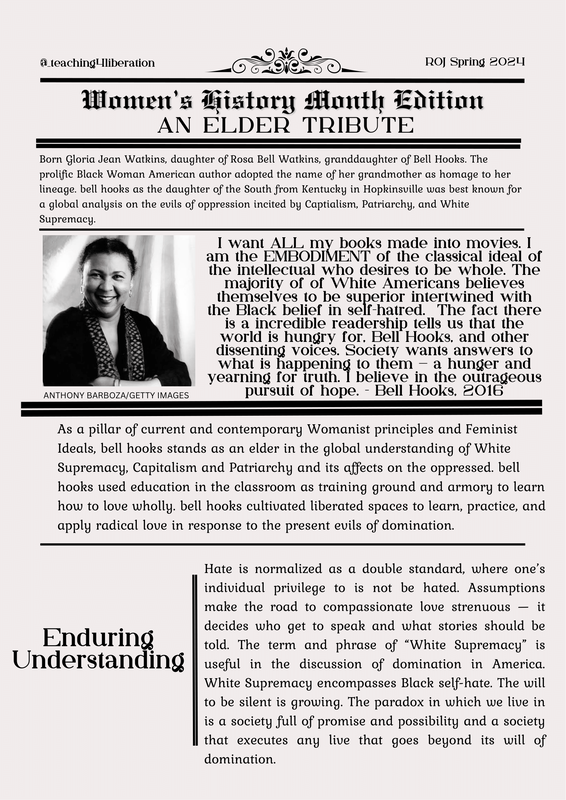
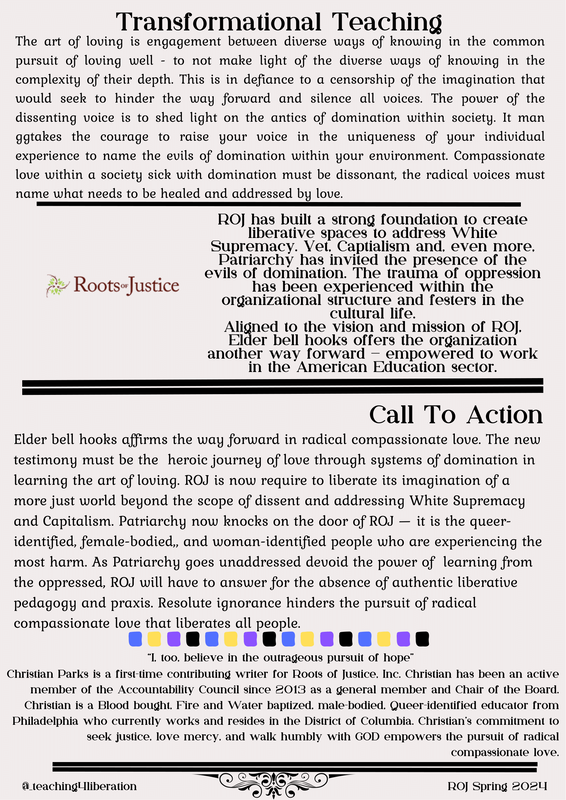
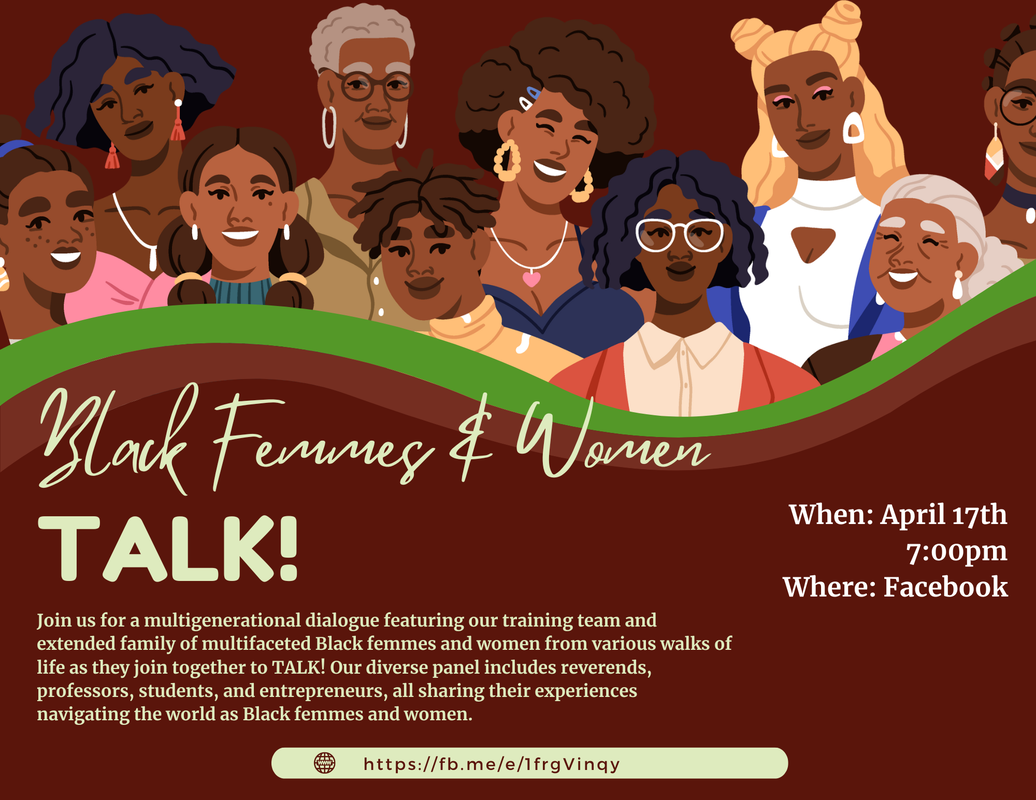
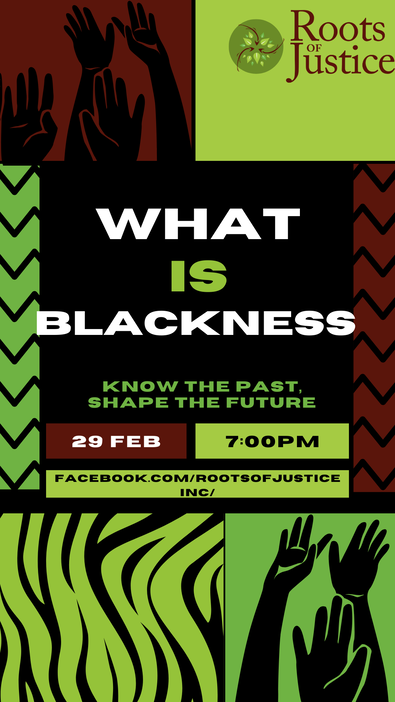
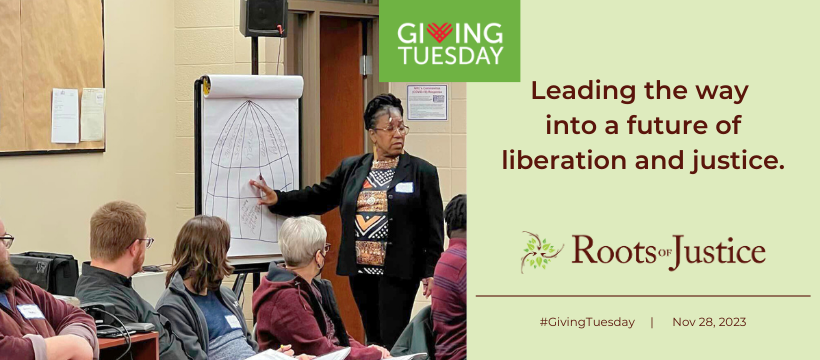

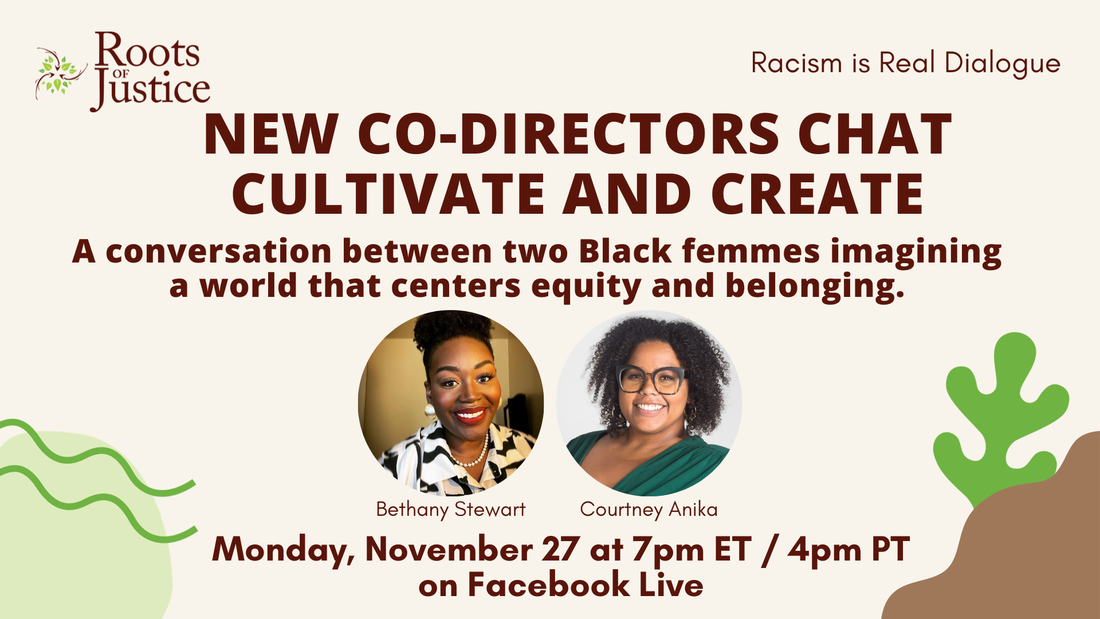
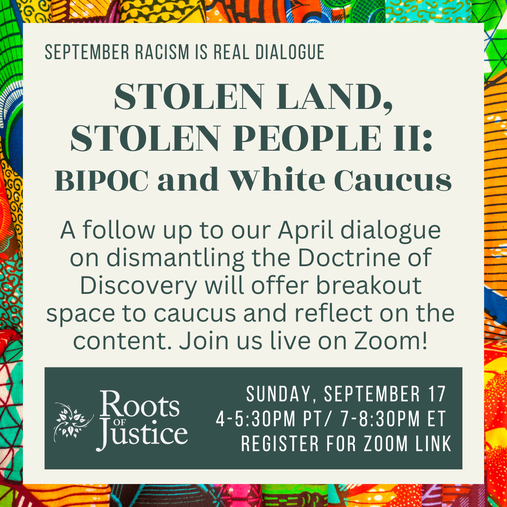
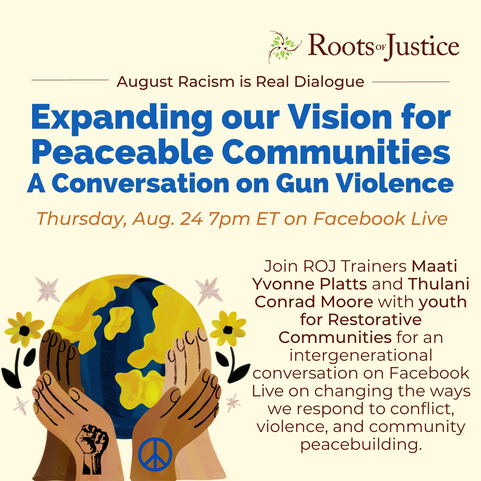
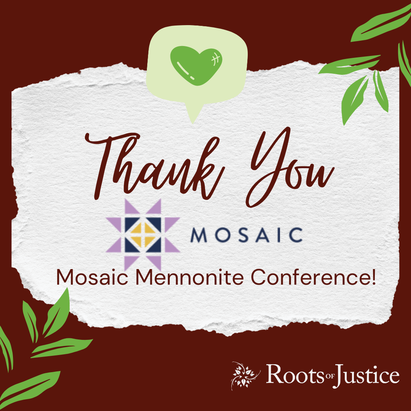
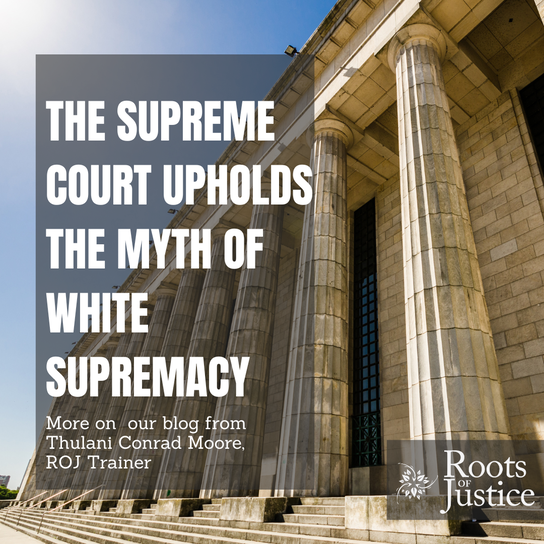
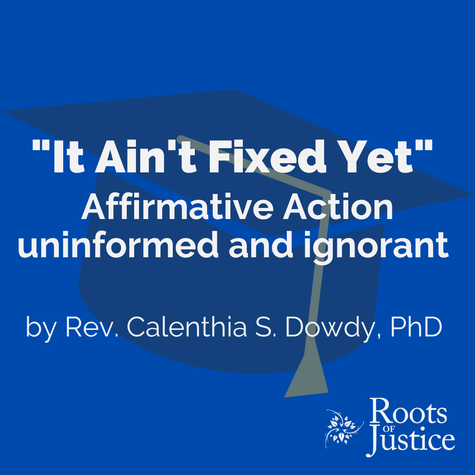
 RSS Feed
RSS Feed